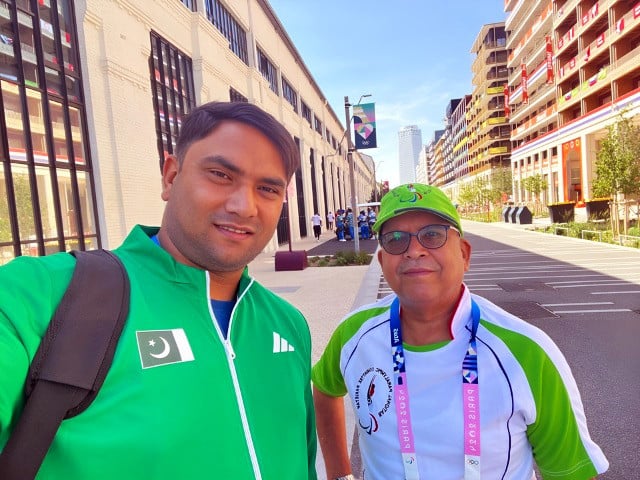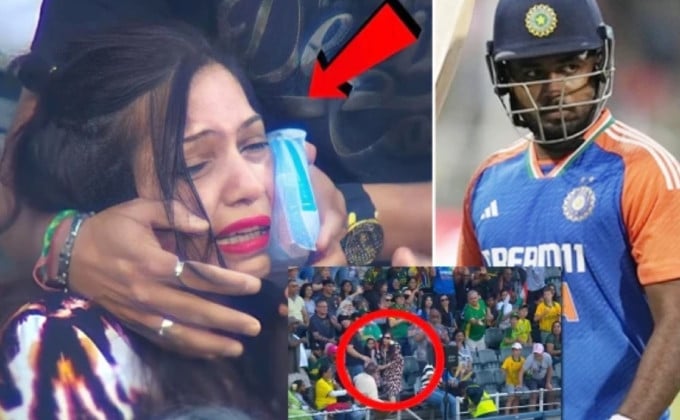
Pakistani athlete Haider Ali is on the cusp of making history as he will be attempting to win his fourth medal at the Paralympic Games on Friday (today) at Stade de France with discus in his hand.
He is already among the country's greatest athletes due to his handsome achievements in a shining career.
Haider directly qualified for the 2024 Paris Games after his stellar performance last year at the 2022 Asian Para Games in Hangzhou with a throw of 51.23 metres in the F37 category.
In 2020, he became the first Pakistani to win a gold medal at the Paralympics in Tokyo Games.
Haider has been building up to that moment with his coach Akbar Mughal, aiming to repeat that feat here in Paris with less than bare minimum resources.
He is competing without any sponsors, and even missed out on the World Championships last year. So he says he has no idea about the athletes against whom he would be competing, but his goal is to be on the podium.
"It is the lack of funds and participation that is always a problem. I don't have any sponsors either," Haider told this correspondent. "I missed the World Championships last year, so participating is an issue. I also have my kids, and sometimes it becomes difficult for me because we generally don't have enough money to manage them and my needs as a professional athlete.
"We don't have proper facilities or the grounds," rues Haider. "I had been training in the rain in Gujranwala, asking my children to fetch my discus for me in a field flooded with rainwater. So things have been tough, but my goal is clear, which is to win for my country."
While he exploded on the global level with his discus throws in the 2020 Paralympic Games, it was a discipline he started to work on in 2012 after sustaining an injury and shifted his focus from long jump to discus throw.
Before the 2020 Games in Tokyo, Haider won a silver medal in 2008 and a bronze medal in 2016 in Beijing and Rio, respectively, while he still feels sad about not being able to win a medal at the 2012 Games in London due to an injury.
"We do not have any individual athlete from Pakistan who has an impeccable record of winning three medals out of four Games that also includes the Olympics, and not just the Paralympics," contended Haider.
"I was always into sports from a very young age. I kept playing sports, cricket, different disciplines in athletics till I got into college," Haider told this correspondent at the Athlete's Village while sitting beside Mughal.
"I come from a family of strong men and athletes, my father was a kabaddi player and my grandfather was a wrestler. My family is from India, Bikaner. That was my grandfather's village. Even today in Bikaner if anyone asks about the wrestler with a box (dabbay wala pehalwaan) people will know. He was the best wrestler in the entire region. So I can say that competing in sports is in my blood," he proudly narrated.
Haider went on to add that he was extremely passionate about cricket and till college, he kept playing it and was a decent fast bowler, a claim lovingly endorsed by his coach Mughal, "He is still a great bowler by the way."
"I was very focused on cricket till I got to college but then I saw that there are other sports too. I observed that pursuing a cricket career becomes so difficult because of nepotism and one needs to have the right connections to play at the highest level," observed Haider.
"So I changed my direction to athletics because I knew that I would go further in athletics professionally, without any connections and purely on merit.
Coach Mughal explained that at the National Paralympics Committee of Pakistan, merit is the only measure of selecting players.
"We don't accept any practices associated with nepotism in any way, we only entertain athletes on merit. If the talent is there and the athlete fulfils the criteria then that is what will take them further, and we can train them the best way we can. There are other very talented para-athletes in Pakistan too, besides Haider," explained Mughal.
Sports helped Haider in mending the effects of cerebral palsy and he got better with it.
"My parents tried to get the best treatment they could for me, but the difference between me and others was always there. But since I got into sports it made me stronger.
"There was a time I could not even change my clothes on my own, I couldn't stand properly on my left side, I was so weak," said Haider.
Today, he stands tall and stronger than average men, purely due to his tireless and dedicated efforts. "The muscles got strong, and I feel so lucky. For me, Allah has kept my sustenance in sport, and I have a career in it. I am glad that Wapda gave me the job," concluded Haider.

1719315628-0/BeFunky-collage-(8)1719315628-0-405x300.webp)


1731329418-0/BeFunky-collage-(39)1731329418-0-165x106.webp)













COMMENTS
Comments are moderated and generally will be posted if they are on-topic and not abusive.
For more information, please see our Comments FAQ